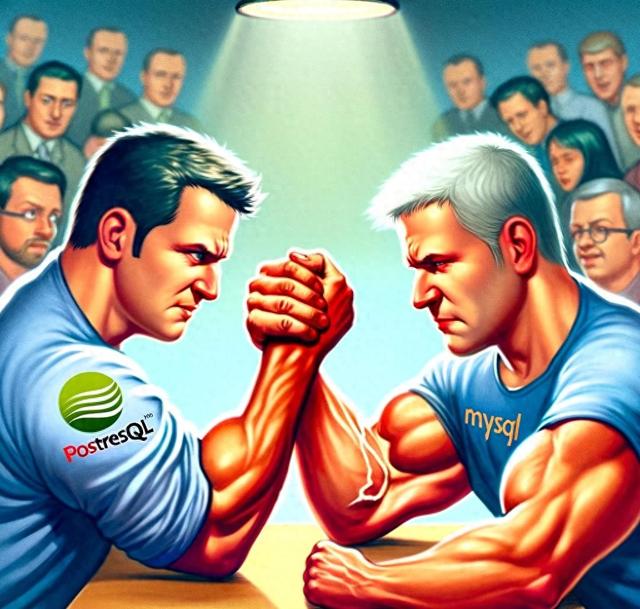在阅读此文之前,麻烦您点击一下“关注”,您的关注是作者持续创作的动力来源,致力于优质的原创内容,坚持不懈的将好的内容呈现给大家,为大家带来良好的阅读体验。
PostgreSQL vs. MySQL: The Battle for Open Source Database DominanceWhen it comes to open source databases, PostgreSQL and MySQL are undoubtedly two shining stars, each attracting developers with their unique features. However, in several key aspects, PostgreSQL showcases its superior strength over MySQL. This article aims to delve into PostgreSQL's core advantages and demonstrate its extraordina
ry capabilities through real-world examples. PostgreSQL triumphs over MySQL: the battle for dominance in the world of open source databases.Database Type: PostgreSQL is an advanced object-relational database management system (ORDBMS) that combines the powerful features of a relational database with the flexibility of an object database. It allows users to create complex data types and custom fu
nctions, providing robust support for designing and implementing intricate data models. In contrast, MySQL is a traditional relational database management system (RDBMS) that focuses primarily on managing tables, rows, and columns, and may struggle when handling complex data and relationships.Features and Capabilities: PostgreSQL offers a range of advanced features and capabilities, such as full
-text search, JSON and XML support, arrays, hstore, multiple index types, window functions, common table expressions, and materialized views. These features enable PostgreSQL to excel in handling complex queries and various data formats. While MySQL also has some advanced features, it may be more limited in terms of full-text search, index types, and advanced query capabilities.Data Integrity an
d Security: PostgreSQL prioritizes data integrity and security. It supports ACID (Atomicity, Consistency, Isolation, Durability) transactions and provides robust data integrity checks and error recovery mechanisms. It also supports SSL encryption and powerful access control mechanisms, ensuring the safety and integrity of data. On the other hand, MySQL may not be as strict as PostgreSQL in terms o
f data integrity checks and error recovery.Community Support: PostgreSQL boasts an active and knowledgeable community, with community members actively participating in the development and maintenance of the project. This community provides a wealth of documentation, tutorials, and third-party extensions. While MySQL also has an active community, it may not have as much support from professional
developers and advanced users.Development and Innovation: PostgreSQL is a true open-source project that encourages community members to contribute to its development and innovation, constantly introducing new features and optimizations. Its openness and innovative spirit attract a large number of developers and advanced users. Although MySQL is also open-source, it is maintained and controlled b
y Oracle, which may limit its pace and extent of development and innovation.Customizability and Scalability: PostgreSQL's design allows for high levels of customization and scalability, leading many well-known projects and companies to choose it as the foundation for their database solutions. Some examples include:- TimescaleDB: A time-series database based on PostgreSQL, designed specifically
for time-series data.- PostGIS: A geographic information system (GIS) database extension based on PostgreSQL, supporting storage and querying of spatial and geographic data.- Citus: A distributed database extension based on PostgreSQL, transforming PostgreSQL into a distributed database to handle large-scale data and high-concurrency workloads.- PipelineDB: A stream processing database based o
n PostgreSQL, designed for real-time data processing.- Greenplum Database: A large-scale data warehousing solution based on PostgreSQL, providing powerful data analysis and machine learning capabilities.- Huawei GaussDB: An enterprise-level database solution developed by Huawei based on PostgreSQL. Leveraging PostgreSQL's powerful features and scalability, it has undergone extensive customizatio
n and optimization to meet the needs of enterprise applications, including performance, security, and stability.By delving into the core aspects of PostgreSQL and MySQL, we can clearly see PostgreSQL's advantages in multiple key areas. Furthermore, listing some databases developed based on PostgreSQL showcases its strong capabilities and wide-ranging applications. In the realm of open source dat
abases, PostgreSQL is not just an excellent choice but also an outstanding representative worth exploring and learning from. Its rich features, strong performance, high customizability, and active community make it a top choice for many developers and businesses.In the future, with further development of the open-source community and continuous technological innovation, we have every reason to b
elieve that PostgreSQL will continue to shine in the field of open source databases, providing us with more powerful and reliable database solutions.In conclusion, PostgreSQL's advanced features, robust performance, high customizability, and active community make it a dominant player in the battle for open source database supremacy. However, it is important for developers and businesses to caref
ully evaluate their specific requirements and consider factors such as data complexity, scalability, and community support before making a decision. What are your thoughts on PostgreSQL vs. MySQL Which features or aspects do you consider most important in an open source database Share your opinions and experiences in the comments below.
以上内容素材来源于网络,如有侵权请联系作者删除,如果您喜欢我的文章,可以点一个免费的“关注”,欢迎大家对于本文发表您宝贵的意见和建议。

 鲁公网安备37020202000738号
鲁公网安备37020202000738号